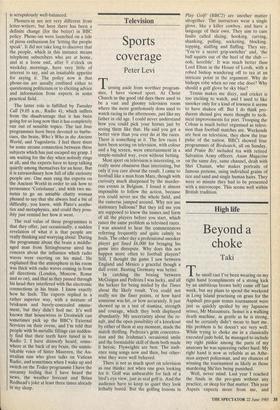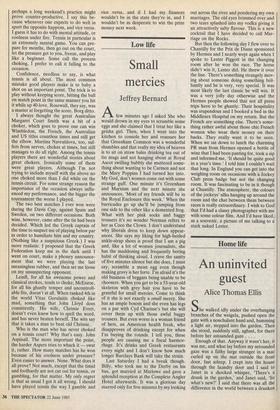High life
Beyond a choke
Taki
The small cast I've been wearing on my right hand (compliments of a strong kick by an ambitious brown belt) came off last week, but my plans to spend the weekend in Long Island practising on grass for the Aspinall pro-gam tennis tournament were just as quickly spoiled by my Japanese sensei, Mr Matsumura. Sensei is a walking death machine, as gentle as he is strong, and he certainly didn't mean to hurt me. His problem is he doesn't see very well. While trying to choke me in a classically executed judo hold, he managed to include my right pinkie among the parts of my anatomy he was squeezing rather hard. My right hand is now as reliable as an Athe- nian airport policeman, and my chances of winning the tournament as likely as those murdering Shi'ites being punished.
Well, never mind. Last year I reached the finals in the pro-gam without any practice, or sleep for that matter. This year Aspers expects more from me, and perhaps a long weekend's practice might prove counter-productive. I say this be- cause whenever one expects to do well in sport the opposite happens, and vice versa. I guess it has to do with mental attitude, or coolness under fire. Tennis in particular is an extremely mental game. You can pre- pare for months, then go out on the court, let the pressure get to you, freeze, and play like a beginner. Some call the process choking, I prefer to call it falling to the occasion.
Confidence, needless to say, is what tennis is all about. The most common mistake good players make is to baby a shot on an important point. The trick is to play without keeping score, hitting the ball on match point in the same manner you hit it while up 40-love. Rosewall, they say, was a master at forgetting the score. Borg ditto.
I always thought the great Australian Margaret Court Smith was a bit of a choker, which goes to prove one can win Wimbledon, the French, the Australian and US titles countless times and still get the elbow. Martina Navratilova, too, suf- fers from nerves, chokes at times, but still manages to do all right. Among the tennis players there are wonderful stories about great chokers. Ironically some of them were great players. Although I'm not trying to include myself with the above no one choked more than I did while on the tennis circuit. For some strange reason the importance of the occasion always influ- enced my performance, and the bigger the tournament the worse I played.
The two best matches I ever won were during the Davis Cup, against Spain and Sweden, on two different occasions. Both wins, however, came after the tie had been decided. Which led the Greek captain of the time to suspect me of playing below par in order to humiliate him and my country. (Nothing like a suspicious Greek.) I was more realistic. I proposed that the Greek Federation keep me in the dark until I went on court, make a phoney announce- ment that we were playing the last meaningless rubber, and then set me loose on my unsuspecting opponent.
Lendl, for all his awesome power and classical strokes, tends to choke; McEnroe, for all his ghastly temper and uncontroll- able fits, doesn't at all. When ranked 4th in the world Vitas Gerulaitis choked like mad, something that John Lloyd does consistently. His wife, Chrissie Evert, doesn't even know how to spell the word, and has never beaten herself. The wits say that it takes a man to beat old Chrissie.
Who is the man who has never choked on a tennis court? Why that's easy. John Aspinall. The more important the point, the harder Aspers tries to whack it — swat it, rather. How many matches has he won because of his coolness under pressure?
Even easier to answer. None. What does it all prove? Not much, except that the timid and foolhardy are not cut out for tennis, or gambling, for that matter. My only regret is that as usual I got it all wrong. I should have played tennis the way I gamble and vice versa, and if I had my finances wouldn't be in the state they're in, and I wouldn't be as desperate to win the prize money next week.















































 Previous page
Previous page